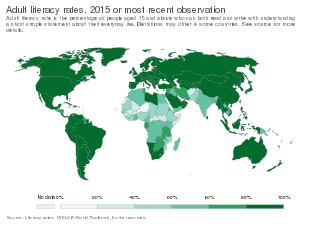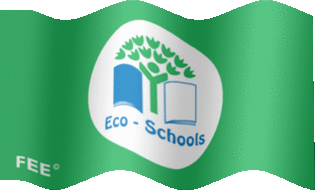
Literacy is the ability to read and write. Some researchers suggest that the study of "literacy" as a concept can be divided into two periods: the period before 1950, when literacy was understood solely as alphabetical literacy ; and the period after 1950, when literacy slowly began to be considered as a wider concept and process, including the social and cultural aspects of reading and writing and functional literacy.
The Association for Progressive Communications (APC) is an international network of organizations that was founded in 1990 to provide communication infrastructure, including Internet-based applications, to groups and individuals who work for peace, human rights, protection of the environment, and sustainability. Pioneering the use of ICTs for civil society, especially in developing countries, APC were often the first providers of Internet in their member countries.

In the United Nations, the Millennium Development Goals (MDGs) were eight international development goals for the year 2015 created following the Millennium Summit, following the adoption of the United Nations Millennium Declaration. These were based on the OECD DAC International Development Goals agreed by Development Ministers in the "Shaping the 21st Century Strategy". The Sustainable Development Goals (SDGs) succeeded the MDGs in 2016.
ActionAid is an international non-governmental organization whose stated primary aim is to work against poverty and injustice worldwide.

The system of education in Uganda has a structure of 7 years of primary education, 6 years of secondary education, and 3 to 5 years of post-secondary education. Education in Uganda is administered in English. All throughout the levels in the education structure, modules are taught and assessed in English. The government of Uganda recognizes education as a basic human right and continues to strive to provide free primary education to all children in the country. However, issues with funding, teacher training, rural populations, and inadequate facilities continue to hinder the progress of educational development in Uganda. Girls in Uganda are disproportionately discriminated against in terms of education; they face harsher barriers when trying to gain an education and it has left the female population disenfranchised, despite government efforts to close the gap.
The history of education in Africa can be divided into pre-colonial and post-colonial periods. Since the introduction of formal education by European colonists to Africa, education, particularly in West and Central Africa, has been characterized by both traditional African teachings and European-style schooling systems.

Education in Rwanda has undergone considerable changes throughout Rwanda's recent history, and has faced major disruptions due to periods of conflict. Education was divided by gender whereby women and men had a different education relevant to their responsibilities in day-to-day life. Women were mostly taught housekeeping while men were mainly taught how to hunt, raise animals, and fish. This is because Rwanda was a community-based society where every member had a specific contribution to the overall development of the community. Older family members like grandparents usually took on the role of educators.
Human rights education (HRE) is the learning process that seeks to build knowledge, values, and proficiency in the rights that each person is entitled to. This education teaches students to examine their own experiences from a point of view that enables them to integrate these concepts into their values. Decision-making, and daily situations. According to Amnesty International, HRE is a A way to empower people is by training them so that their skills and behaviors promote dignity and equality within their communities, societies, and throughout the world.

Eco-Schools is an international programme of the Foundation for Environmental Education (FEE) that aims to “empower students to be the change our sustainable world needs by engaging them in fun, action-orientated, and socially responsible learning.”

Education in Ghana uses a dualistic approach encompassing both formal and informal learning systems. The current formal educational system was introduced during European colonisation. However, learning systems existed prior to that. The University of Moliyili is one of the earliest learning centers in Ghana established in the 1700s. During colonisation, European settlers initially introduced a formal education system addressed to the elites, while education of the average citizen was mainly informal, and based on apprenticeship. Economic activities in pre-colonial Ghana were based on farm produce shared within households and members of each household specialized in providing necessities such as cooking utilities, shelter, clothing, and furniture, and trade with other households was therefore practiced on a very small scale. As such there was no need for employment outside the household that would have otherwise called for disciplines, values, and skills through a formal education system. After colonization, Ghana's economy became a hybrid of subsistence and formal economy.

Literacy in India is a key for social-economic progress. The 2011 census, indicated a 2001–2011 literacy growth of 97.2%, which is slower than the growth seen during the previous decade. An old analytical 1990 study estimated that it would take until 2060 for India to achieve universal literacy at then-current rate of progress.
Dance4life is an international youth initiative to raise awareness and promote prevention of HIV/AIDS.
Fahamu is a not-for-profit organization supporting organizations and social movements championing progressive social change and human rights. With branches in the United Kingdom, South Africa, Senegal, and Kenya, Fahamu primarily engages with civil and human rights organizations through Pambazuka News, an online platform focusing on social justice. Additionally, they offer online courses on human rights and social justice and employ new technologies, including SMS, for information dissemination, lobbying, and interactions.
Operation Day's Work is a solidarity program based on volunteering by high school students. It was first implemented in Sweden to honor the former Secretary-General of the United Nations, Dag Hammarskjöld.
Human rights in South Africa are protected under the constitution. The 1998 Human Rights report by Myles Nadioo noted that the government generally respected the rights of the citizens; however, there were concerns over the use of force by law enforcement, legal proceedings and discrimination. The Human Rights Commission is mandated by the South African Constitution and the Human Rights Commission Act of 1994, to monitor, both pro-actively and by way of complaints brought before it, violations of human rights and seeking redress for such violations. It also has an educational role.

Females in Nigeria have a basic human right to be educated, and this right has been recognized since the year 1948 adoption of the Universal Declaration on Human Rights (UDHR) According to a report in 2014, female education has an important impact on the development of a stable, prosperous and healthy nation state resulting in active, productive and empowered citizens. Educating girls develop growth rates, encourages independence of the girl child and reduces social disparities. In 2009, the Nigerian Population Council (NPC) observed that women with higher educational qualifications are more likely to be in formal wage employment than those at the level of primary school education.

The culture, evolution, and history of women who were born in, live in, and are from the continent of Africa reflect the evolution and history of the African continent itself.
Global citizenship education (GCED) is a form of civic learning that involves students' active participation in projects that address global issues of a social, political, economic, or environmental nature. The two main elements of GCE are 'global consciousness'; the moral or ethical aspect of global issues, and 'global competencies', or skills meant to enable learners to participate in changing and developing the world. The promotion of GCE was a response by governments and NGOs to the emergence of supranational institution, regional economic blocs, and the development of information and communications technologies. These have all resulted in the emergence of a more globally oriented and collaborative approach to education. GCE addresses themes such as peace and human rights, intercultural understanding, citizenship education, respect for diversity and tolerance, and inclusiveness.

Isaac Maigua Mwaura is the current Government Spokesman of Kenya, a former Senator as well as a former Cabinet Administrative Secretary (CAS) - Deputy Minister in the Office of Prime Cabinet Secretary. Mwaura served as a Senator in Kenya's Senate under the Jubilee Party between 2017 and 2022 where he was nominated to represent Persons with Disabilities between 2017 and 2022. He was the third person to occupy that position under the Constitution of Kenya, 2010. He also served as member of Parliament in the National Assembly from 2013 to 2017 after being nominated by the Orange Democratic Movement Party to represents special Interest Groups. He was the first Member of the National Assembly (MP) and Senator in Kenya with albinism. He is a member of the United Democratic Alliance Party (UDA) which is the ruling party under the Kenya Kwanza Administration of President William Samoei Ruto.

Global Changemakers is an international youth organisation with headquarters in Zurich, Switzerland. To date, they have directly trained over 1000 young people and provided grants to 450 youth-led projects in over 128 countries.










